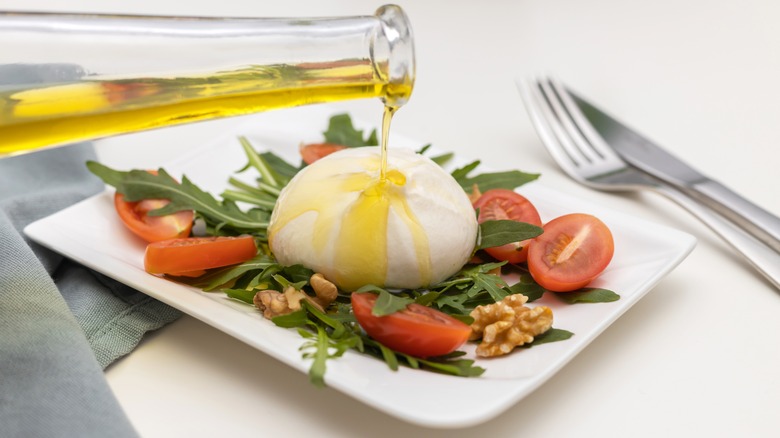Why You Should Always Cook With Two Oils, According To Bobby Flay
There are so many different oils on grocery store shelves that making a choice can be overwhelming. To simplify matters, take a tip from Bobby Flay. According to the Food Network star, you only really need two types for most dishes: A light oil that's suitable for cooking, and another oil for drizzling. "I usually cook with canola oil, and then I finish dishes with extra-virgin olive oil," Flay said in an Instagram video.
The best oil for cooking or finishing comes down to a few factors, including the smoke point (the temperature the oil can be heated to before burning), flavor, and price. Flay's favorite oil for cooking is canola because its smoke point is 400 degrees Fahrenheit, and it has a neutral flavor which doesn't overpower other ingredients. Extra-virgin olive oil, on the other hand, has a smoke point of just 325 to 375 degrees. It's more expensive, and therefore best used sparingly, rather than for frying or roasting — and its rich taste and thicker consistency make it an ideal finishing touch.
However, it's a mistake when cooking with olive oil to assume all varieties are the same. Refined versions — which have undergone treatment with heat or chemicals — are better for cooking, because they have higher smoke points. Light olive oil, which is refined, has a smoke point of 465 degrees and a more neutral taste, so it can be used for cooking, but leave unrefined extra-virgin olive oil for drizzling and dipping.
Use unrefined nut or flavored oils for drizzling, not sizzling
On its own, extra-virgin olive oil adds a distinctive taste and a touch of luxury to all sorts of dishes, whether it's trickled over scrambled eggs, pasta, or poached fish. You can even drizzle desserts with savory olive oil for a beautiful contrast of flavors. It's also a staple ingredient for salad dressings such as vinaigrette — which actually has more uses than you might assume. Bobby Flay uses vinaigrette as a sauce to quickly and easily add "flavor and moisture" to a seared steak, for example (per The Rachael Ray Show).
Unrefined nut oils also work well as garnishes. Try adding a little cold-pressed almond oil to a salad dressing, along with a more neutral oil. Likewise, when cooking with unrefined walnut oil, it's best to avoid heating it and instead use it to dress or dip. The same goes for nutty pistachio, hazelnut, or pecan oil — though these are more expensive than walnut, a little goes a long way.
Infused or flavored oils are also great for finishing dishes. Flay likes to add a small amount of heady truffle oil to a standard extra-virgin olive oil vinaigrette made with balsamic, Dijon mustard, and lemon juice for brightness. He serves it with an earthy wild mushroom salad. Or, try drizzling fragrant lemon oil or punchy wasabi oil to instantly elevate fish or vegetable dishes.


